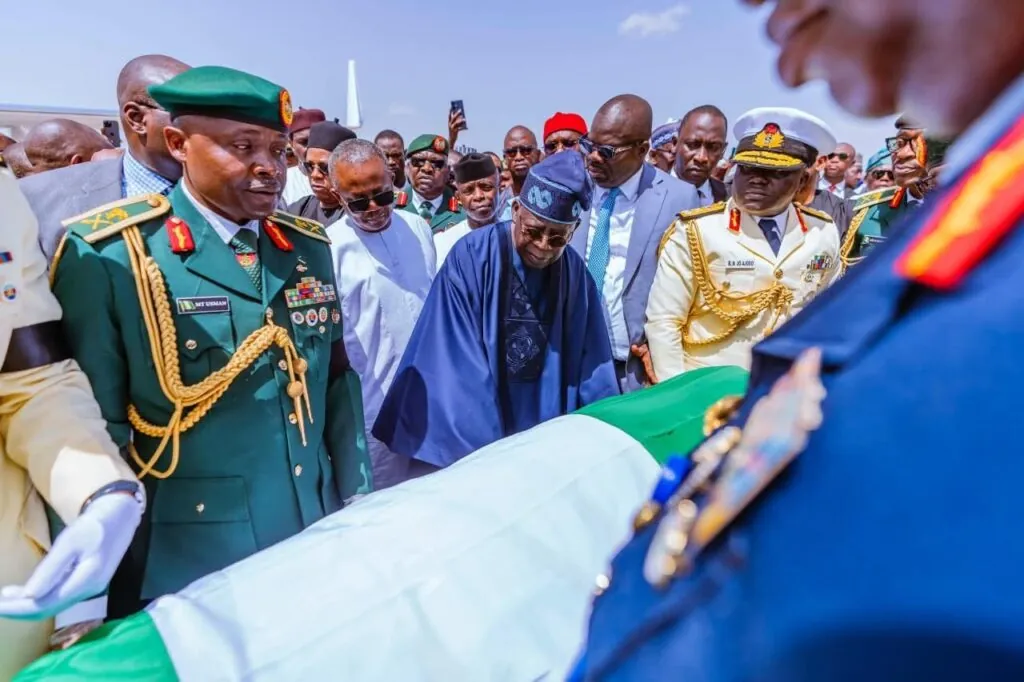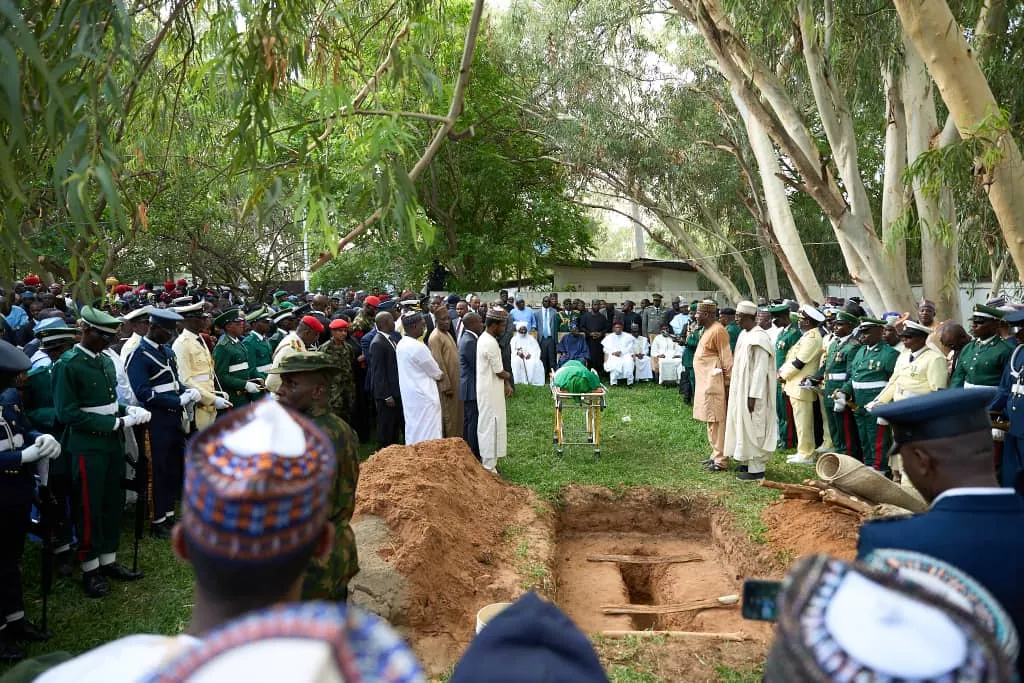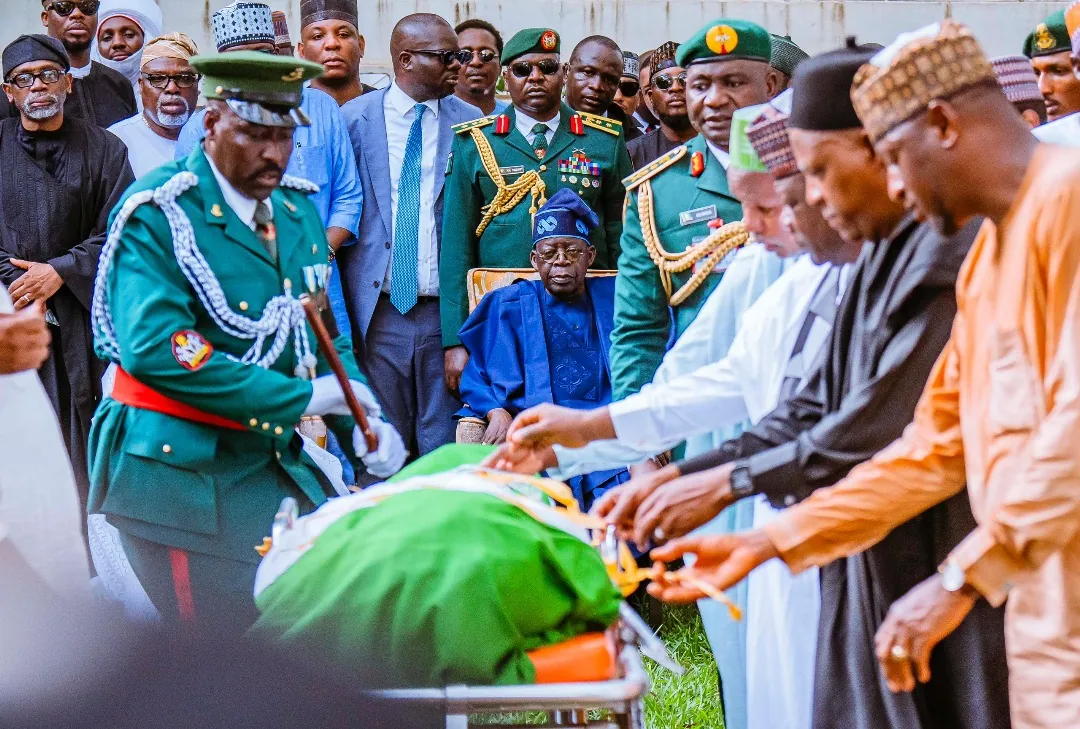In the dusty town of Daura, Katsina State, Nigeria said its final goodbye to former President Muhammadu Buhari. The man who ruled the country for eight years, first as a military head of state and later as a democratically elected president, was laid to rest in a ceremony that brought together presidents, former leaders, and thousands of mourners. Yet, even in death, Buhari remains a figure who divides as much as he unites—a leader whose legacy will be debated for generations to come.
A Gathering of Power
The funeral was a testament to Buhari’s place in Nigerian and African history. President Bola Tinubu led the delegation of current and former leaders who made the journey to Daura. Former presidents from across Africa, governors, ministers, and traditional rulers filled the small town, turning it into a temporary capital of continental mourning. The presence of these dignitaries spoke to the respect Buhari commanded, even among those who disagreed with his policies.
But beyond the formal ceremonies and official tributes, the legacy that Buhari leaves behind is far more complicated than the eulogies would suggest. This was a leader who inspired fierce loyalty and equally fierce opposition, sometimes from the same people at different times in his career.
The Man Behind the Myths
Buhari’s story is one of contradictions that reflect Nigeria itself. He was a military ruler who later embraced democracy, a disciplinarian who struggled to discipline his own government, and a man of simple tastes who led a complex nation. Those who knew him personally often spoke of his integrity, his genuine concern for the poor, and his unwavering belief in a united Nigeria.

His supporters saw him as incorruptible in a system riddled with corruption. They admired his modest lifestyle, his punctuality, and his refusal to accumulate wealth while in office. To them, his legacy is one of moral leadership in an era of ethical decay.
“History will judge Buhari not just by his policies, but by his character. He was a man who tried to do right, even when it was difficult or unpopular.” — A close associate of the former president
The Weight of Unfinished Business
Yet, as the earth covered his grave in Daura, many Nigerians were thinking not just about what Buhari achieved, but about what he could not accomplish. His presidency began with such promise—the change that millions of Nigerians voted for in 2015. He promised to fight corruption, improve security, and fix the economy. Eight years later, the jury is still out on how well he delivered on these promises.
The fight against corruption, while symbolically important, did not transform Nigeria in the way many had hoped. High-profile prosecutions made headlines, but the system that enables corruption remained largely intact. The economy struggled through two recessions, and millions of Nigerians found themselves poorer when he left office than when he arrived.
Security, perhaps his greatest challenge, remained elusive. The Boko Haram insurgency that he promised to defeat continued to plague the northeast. New security threats emerged in other parts of the country, from banditry in the northwest to kidnapping along major highways. The legacy of insecurity overshadowed many of his other achievements.

The Complex Truth About Leadership
What makes Buhari’s legacy particularly complex is that his failures were often not failures of character but failures of system. He was, by most accounts, personally incorruptible, but he struggled to build institutions that could function without him. He cared deeply about Nigeria’s unity, but his administration was often seen as favoring one region over others.
This raises uncomfortable questions about leadership in Nigeria. Is personal integrity enough? Can one honest leader transform a system built on patronage and personal relationships? Buhari’s presidency suggests that the answer is more complicated than his supporters and critics might want to admit.
A Legacy That Transcends Politics
As the funeral concluded and the dignitaries departed Daura, what remained was not just the memory of a former president, but a reminder of the ongoing challenges facing Nigeria. Buhari’s legacy is ultimately a mirror that reflects the country’s own struggles with democracy, development, and unity.
His death comes at a time when Nigeria is grappling with many of the same problems that defined his presidency. The new generation of leaders will have to decide what lessons to draw from his example. Will they focus on his integrity and dedication to service, or will they be motivated by his struggles to translate good intentions into effective governance?
The Continuing Conversation
In the days and weeks following the funeral, Nigerians from all walks of life have been sharing their memories and assessments of Buhari’s legacy. Social media has been filled with both tributes and criticisms, showing that even in death, he remains a polarizing figure.
This ongoing conversation is perhaps the most important part of his legacy. By inspiring such intense debate about leadership, governance, and national priorities, Buhari has forced Nigeria to confront fundamental questions about what kind of country it wants to be.

Conclusion
Muhammadu Buhari has been laid to rest, but his legacy will continue to shape Nigerian politics and society for years to come. He was a leader who embodied both the hopes and the limitations of his generation. His story is far from over—it lives on in the institutions he tried to build, the challenges he could not solve, and the debates he has sparked about the future of Nigeria.
As the dust settles in Daura, the real work of assessing his legacy begins. History will be the final judge, but that judgment will be shaped by what Nigerians choose to do with the foundation he helped to lay.
Stay woke. Stay tuned. Stay with AKEWE NEWS.